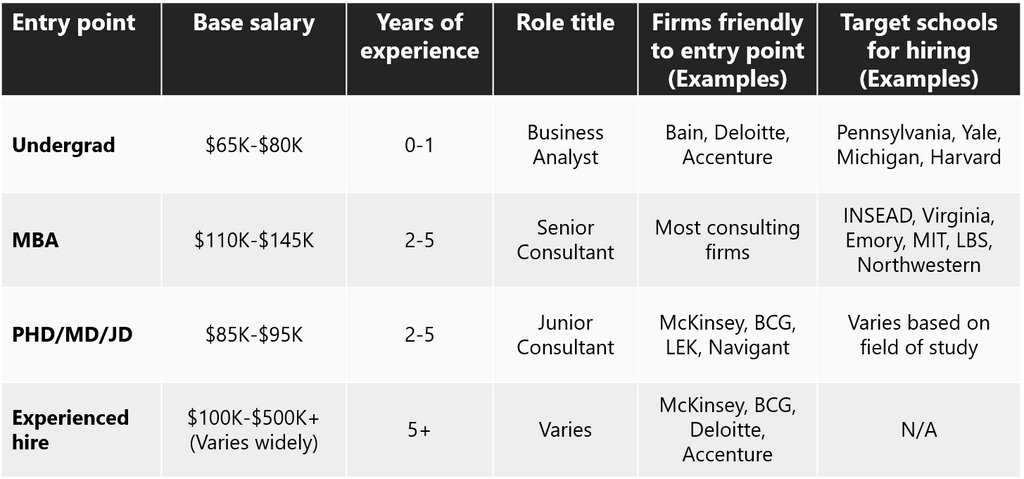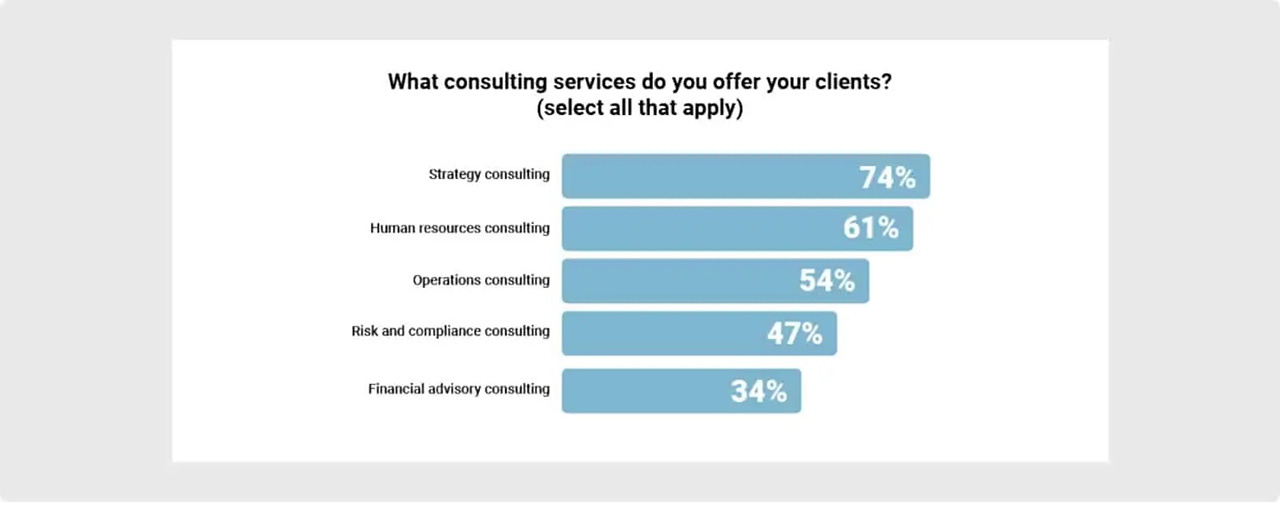
Salary for consultants varies from one company to the next. Many firms are known for offering top-dollar salaries for their experienced staff. While it is possible to negotiate the amount of your offer, you should not expect a big raise. There are still some things you should keep in mind when trying to negotiate the best deal.
Base salary
You might be interested to know the average salary for a consulting career. The average annual salary is between US$51,769 and US$149,770. EY has a salary range of US$172.465 for senior consultants in New York. A senior consultant at EY attends multiple training sessions and receives numerous tools and methodologies for their work.

However, the highest-ranking firms see their salaries increase quickly. It is important to recognize that this increase can also be accompanied by a lifestyle increase. Consulting professionals at the most prestigious firms typically receive a 12-20% raise in pay, and are able to enjoy a more balanced work-life. The financial services industry offers consultants a 30% increase in their pay, which can be very rewarding but also comes with some sacrifices.
Performance bonus
A performance bonus makes up a large part of the consulting salary. It is a significant amount, which can vary depending upon the industry and firm. Some bonuses are more predictable than others. The base salary is 60%, and the top-tier bonus is approximately 60%. You can expect to earn less than six thousand dollars per year if you are below this level.
If you're a recent MBA graduate, you might be tempted to start at a top consulting firm. These firms can offer excellent compensation. For a base salary starting at $190,000., some companies will pay up to $90,000. Additionally, performance bonuses can amount to 5-15 percent of your base salarie.
Profit sharing
Over the past decade, the consulting industry has seen steady increases in its compensation year-over-year. Many firms have increased their total compensation and provided perks like profit sharing. Many companies have increased their base salaries as well as increasing signing bonuses and maximum performance bonus. Many companies have also included perks such unlimited PTO, profit sharing, and other perks.

Niveau of employee
Based on the job type and experience, the salary ranges for different consulting firms vary. Deloitte is one example of a consulting firm that has a fixed salary structure. However, it's possible to negotiate higher salaries. Ask your recruiter for information about the salary if you have relevant work experience. You may be able, depending on the job, to negotiate a lower base salary or sign up bonus.
FAQ
What qualifications do you need to become a consultant in order to get your degree?
Learning a lot about a subject and then applying it to your life is the best way to be an expert.
You can learn all you need to know to become a great consulting professional by starting to study now.
A degree without relevant experience may make it difficult for you to be hired. But, if your qualifications are comparable to those who have been hired, you might still be eligible to apply.
Employers will always search for candidates with real-world experience.
How is consulting different to freelancing
Freelancers work as independent contractors and offer their services without the assistance of an agency or company. They generally charge an hourly rate depending on how long they spend on a client project. Consultants typically work for agencies and companies that employ them. Their salaries are often paid monthly, or annually.
Consultants often have more flexibility, while freelancers can choose to work when they want and set their own rates. Consultants have better benefits, like health insurance, vacation time, sick leave, retirement plans and etc.
What industries use consultants
There are many types of consultants. Some are specialists in one type or another of business.
While some consultants only work for private companies, others represent large corporations.
Many consultants also work internationally to assist companies from all corners of the globe.
How can I become an expert consultant?
It is important to identify an area of passion. Building relationships is the next step. It is crucial to learn about your clients and understand their needs. Finally, you have to deliver results for your clients.
You don't have to be the best at everything, but you do have to be better than everyone else. Passion is key. It doesn't suffice to say, "I will be a consultant." It's important to believe in your abilities and do what you love.
Who hires consultants
Many businesses hire consultants to assist them with their projects. These include small businesses, large companies, government agencies and non-profits.
While some consultants work for these companies, others are freelancers. The process of hiring depends on the size and complexity the project.
You will likely go through multiple rounds of interviews when hiring consultants before you choose the candidate you feel is the best fit for the job.
What is a consultant?
A consultant is someone who provides services for other people. Consultant is not just a job title. It's a position where you help people achieve their goals. This involves helping them to understand their choices and making the right choices.
Consultants have the ability to solve any problems or challenges that may arise from projects. They offer guidance and advice about how to implement such solutions.
Consulting should be able answer any questions related to technology, finance, law and management.
What qualifications are necessary to become a consultant
It's not enough just to have an MBA degree; you must also demonstrate experience working as a business consultant. Two years experience should be gained in consulting or training for a major corporation.
You should have had experience working with senior management to create strategy. This will require you to be comfortable sharing your ideas with clients and getting their buy-in.
You'll also need to pass a professional qualification exam such as the Chartered Management Institute's Certified Management Consultant (CMC) certification.
Statistics
- According to IBISWorld, revenues in the consulting industry will exceed $261 billion in 2020. (nerdwallet.com)
- 67% of consultants start their consulting businesses after quitting their jobs, while 33% start while they're still at their jobs. (consultingsuccess.com)
- "From there, I told them my rates were going up 25%, this is the new hourly rate, and every single one of them said 'done, fine.' (nerdwallet.com)
- Over 50% of consultants get their first consulting client through a referral from their network. (consultingsuccess.com)
- According to statistics from the ONS, the UK has around 300,000 consultants, of which around 63,000 professionals work as management consultants. (consultancy.uk)
External Links
How To
What does a typical consultant's day look like?
Your work type will determine the length of your day. You'll spend your time researching new ideas and meeting clients.
You'll often have meetings with clients where you can discuss issues and solve problems. These meetings may be over the phone via email, on-line, or face-to–face.
Sometimes, you may be asked to create proposals. These are documents that outline your ideas and plans for clients. These proposals will be presented to clients by you and a mentor.
After all the preparation and planning, it's time to actually create some content. You could write articles, design websites, edit photos or conduct interviews.
Depending on the scope of the project, you may need to do some research in order to gather relevant statistics or figures. For instance, you might want to find out how many people you have and if they are buying more than just one product or service.
Once you have enough information, it is time to present your findings and conclusions to clients. You may give your findings orally or in written form.
After the initial consultation, it is important to follow up with clients. You might contact them regularly to check on their progress or send them emails to confirm they have received your proposal.
Although this process can take time, it is important to stay focused and build good relationships with your clients.